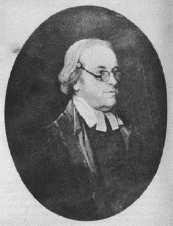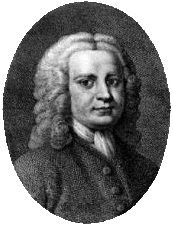-
-
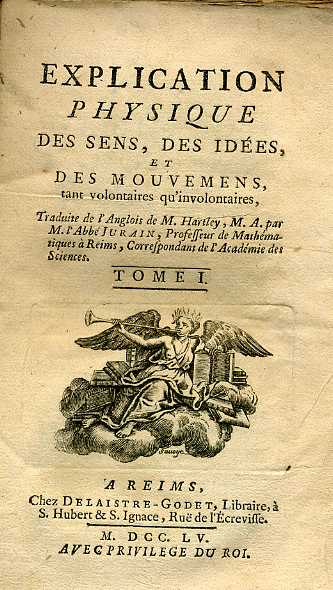
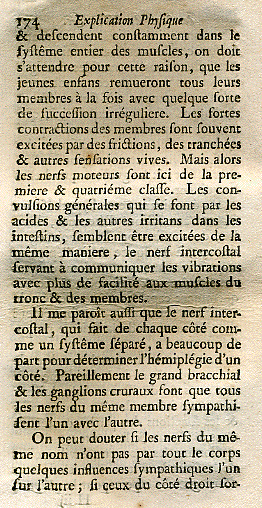 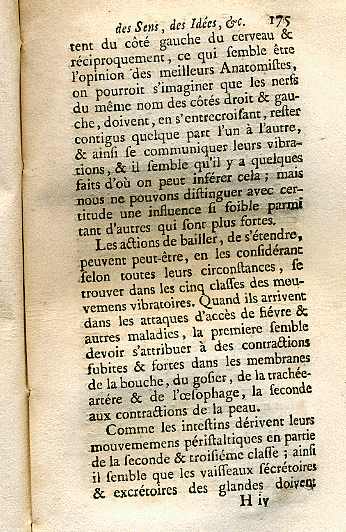 -
- Explication physique des
sens, des
idées et des mouvements
- A Reims Chez Delaistre-Godet 1755, 1755. 2
vol. in-12 de XXXV-(1)-502 pp. ;
VIII-(2)-474-(6) pp.,
-
- Première édition
française rare de l'ouvrage de David
Hartley (1705-1757), médecin anglais,
considéré comme le fondateur de la
psychologie d'association. L'édition
originale est parue à Londres en 1749
sous le titre Observations on Man, His Frame,
His Duty, and His Expectations. Hartley
développe sa principale théorie.
« Il y a deux choses dans l'homme, des
sensations et des idées. Les sensations
sont des causes, et les idées des effets.
Cependant nos idées sont distinctes ; les
unes sont concrètes, c'est à dire
se rapportent à des sujets sensibles, les
autres sont abstraites ; ces dernières
sont les idées de genre et
d'espèces. les idées de sensation
sont les éléments dont se
composent toutes les autres »
-
- Hartley
David, né à Ilingworth en
1705, mort à Bath en 1757, a
publié : Observations sur l'homme, son
organisation, ses devoirs et ses
espérances en 1749 (2 volumes traduits.
en français par l'abbé Jurain,
1755) et sous le titre de l'Homme, de ses
facultés physiques et intellectuelles,
(traduit par l'abbé Sicard, 1802)
Exposé des preuves pour ou contre le
remède de Mlle Stephens pour dissoudre la
pierre, en 1739.
-
- David
Hartley
(1705-1757) is the author of
Observations on Man, his Frame, his Duty, and
his Expectations (London: Printed by S.
Richardson; For James Leake and Wm.
Frederick.1749. In two volumes.) - a
wide-ranging synthesis of neurology, moral
psychology, and spirituality (i.e., our "frame,"
"duty," and "expectations").
-
- English philosopher, founder of the
associationist school of psychologists.
Originally intended for the Church, Hartley
instead took up the study of medicine,
practicing as a physician in Newark, London and
finally, Bath.
-
- The above work "Observations on Man" was
published in 1749, three years after Condillac's
"Essai sur l'origine des connaissances
humaines," in which similar themes are
expounded.
-
- The work is divided into two parts: the
first dealing with the frame of the human body
and mind, and their mutual connections and
influences; the second with the duty and
expectations of mankind. His two main theories
are the doctrine of vibrations and the doctrine
of associations. Hartley tell us that his
physical theory was drawn from certain
speculations as to nervous action which Newton
had published in "Principia." With his physical
theory, Hartley gave the first strong impulse to
the modern study of the intimate connection
between physiological and psychical.
-
- The son of an Anglican clergyman, David
Hartley was born in June 1705 in the vicinity of
Halifax, Yorkshire. His mother died three months
after his birth, and his father when David was
fifteen. After receiving his B.A. and M.A. from
Jesus College, Cambridge, Hartley practiced
medicine in Bury St. Edmunds (1730-35), London
(1735-42), and Bath, where he died on 28 August
1757. He married twice: in 1730, Alice Rowley,
who died in 1731 giving birth to their son David
(1731-1813); and in 1735, Elizabeth Packer
(1713-78), despite the opposition of her very
wealthy family. The couple had two children,
Mary (1736-1803) and Wincombe Henry (1740-94).
Although severely afflicted with bladder stones,
Hartley lived a full and active life: he
practiced medicine, engaged in mathematical
research, sought a cure for "the stone," devoted
himself to intellectual and philanthropic
projects, and wrote the Observations on
Man.
-
- De
l'influence des passions de l'âme dans les
maladies et des moyens d'en corrriger les
mauvais effets
- Clément Joseph
Tissot
- Amand-Koenig libraire
à Paris et Strasbourg
- 1798
-
- "Y a-t-il une anatomie
pour les facultés intellectuelles ainsi
que pour celles du corps ? Si on analyse les
premières, trouve-t-on qu'elles ont
besoin d'un ressort qui les mette en en jeu et
qui les rende, si on peut s'exprimer ainsi,
élastiques? Oui sans doute; ce sont les
passions qui communiquent à l'âme
son mouvement. L'action des passions est donc
une chose essentielle à notre
constitution, parce que leur origine est dans la
sensibilité physique, dans l'amour du
plaisir et la crainte de la douleur qui remuent
également tous les hommes."
|
